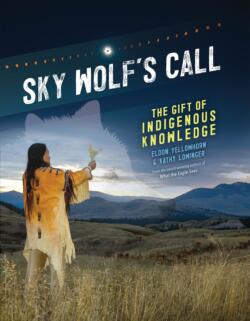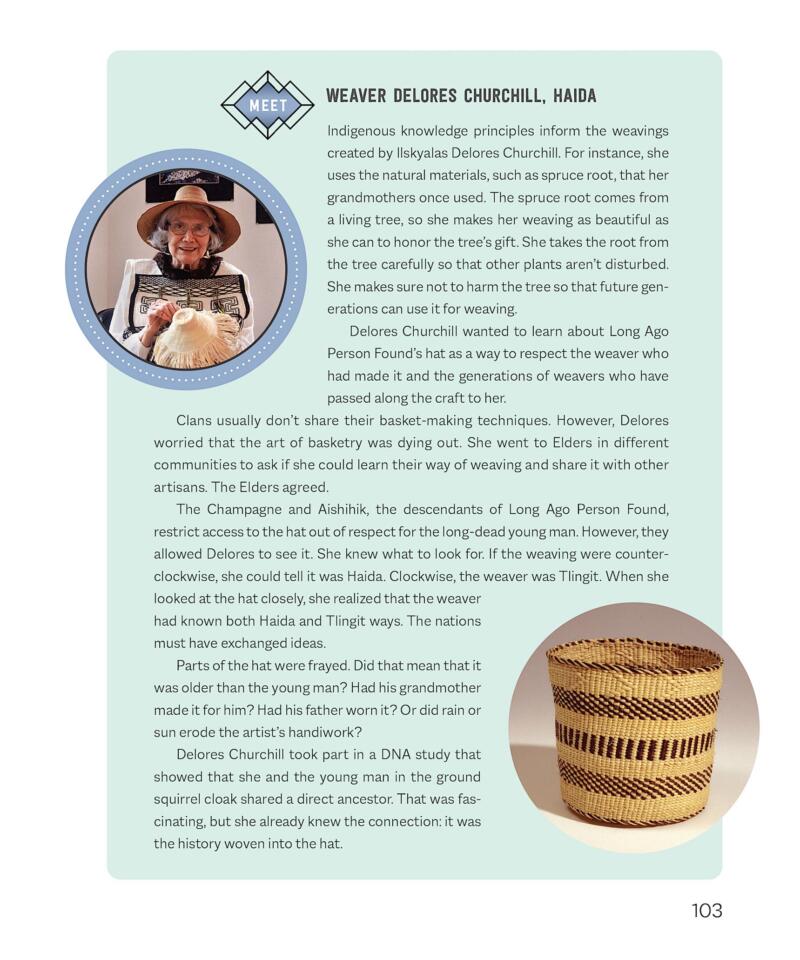1420 Answering the TRC call
Sky Wolf’s Call: The Gift of Indigenous Knowledge
by Eldon Yellowhorn and Kathy Lowinger
Toronto: Annick Press, 2022
$24.95 / 9781773216300
Reviewed by Kristina Hannis
*
 We call upon the Federal, provincial, and territorial governments in consultation with Survivors, Aboriginal peoples, and educators to:
We call upon the Federal, provincial, and territorial governments in consultation with Survivors, Aboriginal peoples, and educators to:
Make age-appropriate curriculum on residential schools, Treaties, and Aboriginal peoples’ historical and contemporary contributions to Canada a mandatory requirement for kindergarten to Grade Twelve students.
So reads Truth and Reconciliation Commission of Canada: Call to Action, no. 62. [1]
Following up on Turtle Island: The Story of North America’s First Peoples, and What the Eagle Sees, award winning authors Dr. Eldon Yellowhorn and Kathy Lowinger’s new young adult book, Sky Wolf’s Call: The Gift of Indigenous Knowledge is an introduction to Indigenous technology and innovation. Beautifully illustrated and compiled from short visually appealing segments, this book is easy to read and covers a lot of ground. Sky Wolf’s Call has an astoundingly broad scope introducing Indigenous Traditional Ecological Knowledge (TEK) in North America from time immemorial to the current day. This is an especially lofty goal for a book of barely over 100 pages.

Taking up the task with thematic chapters, the book begins with an introduction to Indigenous knowledge systems, and short segments on water, fire, healing, food security, sky knowledge, and knowledge keeping. The authors introduce Indigenous technology and provide concrete example of work Indigenous communities are doing to reclaim their land management practices.
Each section includes Niitsitapi stories from Yellowhorn’s Piikani Niitsitapi community as well as philosophical concepts and technology from Indigenous communities across North America, with short profiles of Indigenous scientists, and community projects.


The book begins by explaining how Indigenous knowledge systems can work alongside western production of knowledge with a profile on Mi’kmaq Elder Albert Marshall Jr. and a discussion of Etuapmumk or Two Eyed Seeing. The water knowledge segment introduces Hokokam Canals systems and Mi’kmaw water highways and transitions to recent water rights court decisions, fights against dam projects, and contemporary movements for First Nations to have safe drinking water. In the section centred around fire, the book discusses cultural burnings, and the origin of Indigenous Peoples Burning network, contextualizing modern issues with the Indigenous philosophical concepts guiding Indigenous activists in their work. Discussions of healing includes traditional medicines and the history of plants like tobacco and sage, to how sweat lodges are being used successfully to treat veterans with PTSD. Impressively, the food security chapter somehow squeezes in fisheries management, Bison repopulation efforts, clam gardens, and Indigenous agriculture. Sky knowledge explores a range of topics from Indigenous Astronomy, wayfinding, Indigenous calendar systems and ways of keeping time. The book concludes with how Indigenous societies kept and organized their knowledge including oral history, pictographs and petroglyphs, Niitsitapi winter count, and Aztec Libraries. This fast paced celebration of Indigenous innovation and technology is riveting — each one of these chapters has enough content for its own book.
One of the strengths of this book is the balance of broad concepts with detailed examples and profiles of Indigenous innovators. The short segments and profiles leave you wanting more though, and this book could go further by providing a further reading segment at the end of each chapter. There is a helpful brief selected reading section, sources, and acknowledgement list at the end of the book, but as a short book covering a vast topic a comprehensive further reading list would be very useful. For example, the segment on clam gardens could provide links to the First Nations who are rebuilding their gardens, as well as the academic scholarship on the topic which has blossomed in the past decade.


This is a timely and necessary book; the baseline understandings of Indigenous land management practices it outlined teaches us to see the Indigenous presence that settler colonialism has tried to erase. On March 4, 2022 as I was writing this review, the BC Ministry of Education and the First Nations Education Steering Committee (FNESC) announced a new Indigenous-focused graduation requirement for secondary students in BC schools,[2] finally fulfilling the TRC Call to Action to require Indigenous focused coursework.[3] Thankfully we have this new resource to support this good work.
This book introduces us to the Niitsitapi story of the sky wolves, who taught how to live together in a good way. In light of this teaching, Sky Wolf’s Call is a celebration of Indigenous knowledge and a response to the TRC Calls to Action, offering a tool to support the teaching of Indigenous history in Canadian schools. As with Yellowhorn and Lowingers’ other books, it is also a delight to read and long overdue.
*

Kristina Hannis grew up in Edmonton, in Treaty Six territory. She received an MA in Archaeology from Simon Fraser University in 2012. Currently she works as a researcher for the Union of BC Indian Chiefs. She lives in East Vancouver, in the shared territories of the xʷməθkʷəy̓əm (Musqueam), səlilwətaɁɬ (Tsleil-Waututh) and Swwú7mesh (Squamish) Nations. Editor’s note: Kristina Hannis has also reviewed two previous books by Eldon Yellowhorn and Kathy Lowinger: Turtle Island: The Story of North America’s First People, and What the Eagle Sees: Indigenous Stories of Rebellion and Renewal, both from Annick Press.
*
The British Columbia Review
Publisher and Editor: Richard Mackie
Formerly The Ormsby Review, The British Columbia Review is an on-line journal service for BC writers and readers. The Advisory Board consists of Jean Barman, Wade Davis, Robin Fisher, Cole Harris, Hugh Johnston, Kathy Mezei, Patricia Roy, Maria Tippett, and Graeme Wynn. Provincial Government Patron (since September 2018): Creative BC. Honorary Patron: Yosef Wosk. Scholarly Patron: SFU Graduate Liberal Studies.
“Only connect.” – E.M. Forster
*
Endnotes:
[1] Truth and Reconciliation Commission of Canada Calls to Action.
[2] Beginning in the 2023-2024 school year.
[3] Governments and institutions in Canada have been slow at adopting the recommendations of the TRC commission. For a 2021 report card on how far we can have come in answering the calls to action see the Yellowhead Institute report